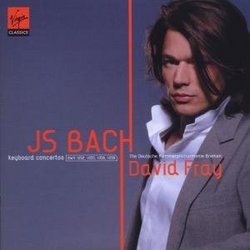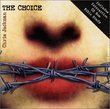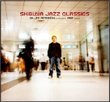| All Artists: Johann Sebastian Bach, David Fray, Bremen German Chamber Philharmonic Title: J.S. Bach: Keyboard Concertos BWV 1052, 1055, 1056, 1058 Members Wishing: 0 Total Copies: 0 Label: Virgin Classics Original Release Date: 1/1/2009 Re-Release Date: 1/13/2009 Genre: Classical Styles: Chamber Music, Forms & Genres, Concertos, Historical Periods, Baroque (c.1600-1750), Classical (c.1770-1830) Number of Discs: 1 SwapaCD Credits: 1 UPCs: 400000012988, 5099921306426 |
Search - Johann Sebastian Bach, David Fray, Bremen German Chamber Philharmonic :: J.S. Bach: Keyboard Concertos BWV 1052, 1055, 1056, 1058
 | Johann Sebastian Bach, David Fray, Bremen German Chamber Philharmonic J.S. Bach: Keyboard Concertos BWV 1052, 1055, 1056, 1058 Genre: Classical
After his striking debut album of works for solo piano by Bach & Boulez, David Fray focuses on four of Bach's six concertos for keyboard, directing the Deutsche Kammerphilharmonie from the piano. David Fray has a reso... more » |
Larger Image |
CD DetailsSynopsis
Album Description After his striking debut album of works for solo piano by Bach & Boulez, David Fray focuses on four of Bach's six concertos for keyboard, directing the Deutsche Kammerphilharmonie from the piano. David Fray has a resolute commitment to the German repertoire, and more particularly to Bach whom he called in a recent interview "a pinnacle; both a beginning and an end." In this new recording, he displays from beginning to end his close affinity with the composer, showing his technical and musical understanding of these 4 major concertos, both as soloist and conductor. Similar CDs
|
CD ReviewsAn emotional (but never over-emotional) journey Erik Ketzan | Orbis Tertius | 01/13/2009 (4 out of 5 stars) "I have numerous recordings of these famous Bach concertos, and the young French pianist David Fray's is a fine addition to the field. Although only on his third album, it seems from reviews here on Amazon and its European sites that Fray is already something of a divisive character, perhaps because his album cover glamour shot invites comparison to classical lite artists, or maybe because of his eccentricities at the keyboard (which recall Glenn Gould, a very "love him or hate him" figure). But no listener of classical music-- casual or hardcore-- should dismiss Fray, a serious talent with star potential in a field badly in need of some stars, especially those who don't simplify the repertoire. Fray conducts from the bench, and the Deutsche Kammerphilharmonie Bremen, one of Europe's finest chamber orchestras, sounds subtle and superb. The meeting of Fray and the Kammerphilharmonie is chronicled in this album's accompanying documentary, David Fray: J.S. Bach - Swing, Sing and Think, which captures the musical synergy that emerges here despite the tension between David Fray, acting the highly emotional artiste, and the veteran musicians of the Kammerphilharmonie, who smirk a bit at the young Fray's fire but amiably attempt to follow his alternately vague and flowery instructions. The specter of Glenn Gould hovers over Fray and these concertos, or as Fray describes him in the liner notes to the documentary, "that rascal Gould, who has stamped his indelible mark on them." The documentary director Bruno Monsaingeon writes, "in other words, it's a matter of finding a way of playing Bach after Gould." Fray's way is a generally romantic approach, an overall effort to trace the emotional journey contained in Bach's music. In contrast is Murray Perahia's much-praised renditions, Bach: Keyboard Concertos Nos. 3, 5, 6, 7, which similarly teases new colors from certain passages but comes across as overly mannered. Fray, on the other hand, applies his romantic vision to the pieces in their entirety, so that when he does bring unique phrasing to a passage it does not seem so self-conscious. Again, it is Fray's consistently emotional approach to the music that distinguishes him. Most importantly, it's an approach that pays off-- Fray and the Kammerphilharmonie sound great and the music is beautiful. If you need only one recording of these works by Bach, this album could easily be it. It's worth comparing Fray's with the Bach Concertos recently recorded by the young German pianist Martin Stadtfeld, J.S. Bach: Piano Concertos. Both are charismatic young Europeans of almost the same age (born 1980 and 81), hyped in their home countries, big on Bach and among the few young pianists worldwide with exclusive big-label recording contracts. Stadtfeld and Fray have radically different approaches. Stadtfeld is all about speed and clarity: Bach speeding by with the gas pedal down. Fray does much the opposite: a journey through Bach's landscape that stops to smell ever rose. To speak in sweeping generalization, Stadtfeld takes a very German approach, Fray a very French. Not that classical music is a competition, but Fray presents a more cohesive overall vision of the music than his contemporary Stadtfeld and emerges, in this round at least, as the more impressive talent." Simply magnificent! J. L. Bertram | South Africa | 01/18/2009 (5 out of 5 stars) "I know that there are stuffy purists out there who would not approve of David Fray's interpretations of these Bach concertos, but don't let that put you off as after all, Bach never originally wrote these as PIANO concertos anyway - they are transcriptions of works for other instruments. This album is an absolute joy; Fray infuses these pieces with new life, exquisite beauty and new insights. For me what stands out is the attention to detail - every note, every tone seems to be carefully considered, with nothing out of place. The quality of the recording is superb, piano and orchestra nicely balanced. It's such a pleasure to rediscover these works. I wouldn't hesitate to recommend this recording." Magnificent young French pianist and Bach interpreter Damian Gruca | Nierstein, Germany | 04/05/2009 (5 out of 5 stars) "Mr. Fray is the best (so far) interpreter of these Bach's concerts.
Nevertheless his idol was Glen Gould, his concerts are much better, that any ever heard before (incl. Andras Schiff and others). He is still very young, but he feels Bach, not just plays him. As a French artist he is more capable of understanding J.S.Bach, as any other, not only German pianists. Additionally he makes the small chamber orchestra feel the same as they record the concerts together (The Deutsche Kammerphilharmonie Bremen). The best way of showing how he thinks of Bach and feels him is the DVD - "Swing, Sing & Think" of Bruno Monsaigeon. Fantastic. We need more such young artists." |

 Track Listings (12) - Disc #1
Track Listings (12) - Disc #1

